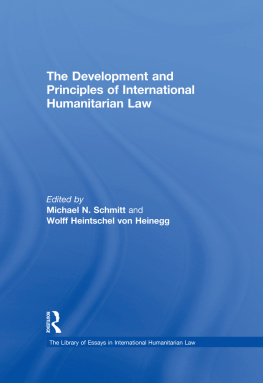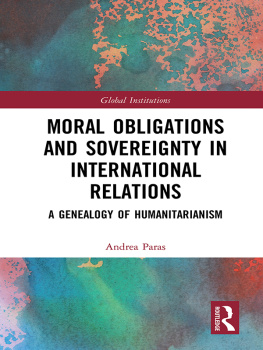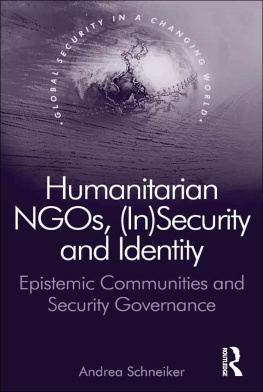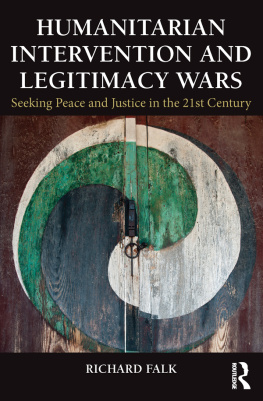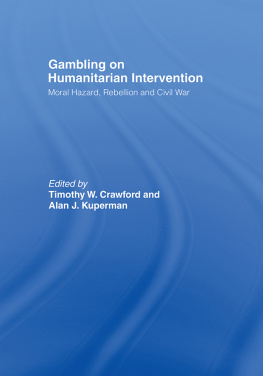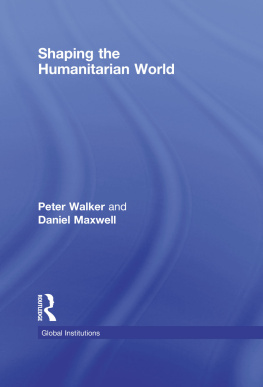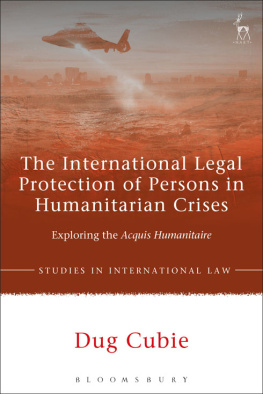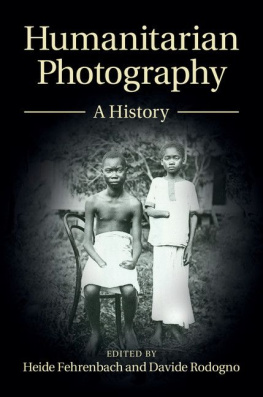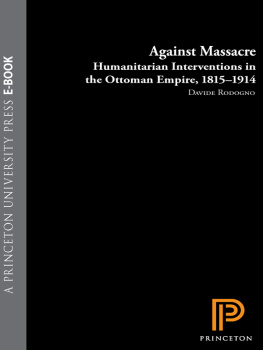The political negotiations conducted by international human organisations to gain access to civil war victims has long taxed humanitarians and governing authorities. This illuminating account draws upon archives and other original sources to explore the clashes during civil wars between sovereign authorities in Sri Lanka, Russia, Ethiopia and Sudan and universalist organisations such as Mdecins sans Frontires. Andrew Cunninghams approach demonstrates the complexity of negotiating structures and discordant discourses, in a book of many insights containing valuable lessons for humanitarians.
Michael Pugh, Professor Emeritus in Peace and Conflict, University of Bradford, UK
Cunninghams book tackles a gaping fissure in todays humanitarian practice the seemingly irreconcilable clash between the moral actions of the aid agency and the exercise of political power by the state. Given current trends in the establishment of state sovereignty, the mistaken humanitarian emphasis on state-avoiding approaches will only further doom their access to people in crisis. Put simply, Cunninghams analysis of the state-INGO relationship makes not for interesting research; it should become required reading.
Marc DuBois, Independent Humanitarian Consultant, former Executive Director, MSF-UK
Amidst increasing efforts by states to limit the actions of INGOs operating within their borders, Cunningham provides much-needed insight into the narratives, rules, norms and discourses that shape NGO-state relationships. He masterfully highlights the complex political realities faced by both humanitarian NGOs and the states in which they work, making this a must-read for policymakers, donors, NGO workers, and anyone interested in understanding when and why humanitarian interventions succeed or fail.
Jennifer N. Brass, School of Public & Environmental Affairs, Indiana University, USA
How states and international humanitarian actors relate to each other matters because when the relationship breaks down people in need dont receive lifesaving assistance. This book is crucial reading for researchers and practitioners to understand how that happens and what could be done to build more constructive partnerships better able to assist and protect people in times of crisis.
Paul Harvey, Partner, Humanitarian Outcomes, UK
Andrew Cunninghams carefully-researched book offers important insights, evidence and a framework that bridges academia and operational realities in the complex field of international humanitarian and development action, poverty reduction and social change in fragile states. His work offers a valuable contribution to the sector at a pivotal time in history.
Abby Maxman, CEO and President, Oxfam America, USA
This is a thought provoking, empirically informed and very rich analysis of the complex and often fraught relationship between humanitarian NGOs and states in times of humanitarian crises. Written by someone with impeccable credentials for exploring that relationship in detail, it dissects the politics and political nature of humanitarian crises in eye-opening fashion.
Mats Berdal, Department of War Studies, Kings College London, UK
This book provides a long-awaited and most timely discussion of how humanitarian actors can better relate to the government in crisis areas. Theoretically well-informed and grounded in the authors vast experience, the book analyses aid-state relations in Sri Lanka, Ethiopia, Sudan and Russia. The book provides a solid escape from the usual idea of a battle between the high morals of humanitarians and the low politics of state. Rather than providing a simple tool-box for humanitarian diplomacy, the book seeks to support humanitarians (and states for that matter) with nuanced and context-specific understandings of how access can be negotiated.
Dorothea Hilhorst, Professor of Humanitarian Aid and Reconstruction, International Institute of Social Studies, Erasmus University, The Netherlands
Are good intentions enough? More often than not, humanitarian imperatives clash with state prerogatives rendering the delivery of life-saving assistance more difficult. Cunningham convincingly argues the need for understanding contexts and for meaningful engagement between governmental and the non-governmental actors so that human life is saved and protected in times of crises. Essential reading for leaders, researchers, and aid workers.
Unni Karunakara, Yale School of Public Health, and US and International President, Mdecins Sans Frontires (20102013)
INTERNATIONAL HUMANITARIAN NGOS AND STATE RELATIONS
International Humanitarian NGOs and State Relations: Politics, Principles and Identity examines the often discordant relationship between states and international nongovernmental organisations working in the humanitarian sector. INGOs aiming to provide assistance to populations suffering from the consequences of conflicts and other human-made disasters work in the midst of very politically sensitive local dynamics. The involvement of these non-political international actors can be seen as a threat to states that see civil war as a state of exception where it is the governments prerogative to act outside normal legal or moral boundaries. Drawing on first-hand experience of humanitarian operations in contexts of civil war, this book explores how the relationship works in practice and how often clashing priorities can be mediated.
Using case studies of civil conflicts in Sri Lanka, Darfur, Ethiopia and Chechnya, this practice-based book brings together key issues of politics, principles and identity to build a negotiation structure for analysing and understanding the relationship. The book goes on to outline a research and policy development agenda for INGOS to better adapt politically to working with states.
International Humanitarian NGOs and State Relations will be a key resource for professionals and policy makers working within international humanitarian and development operations, as well as for academics and students within humanitarian and development studies who want to understand the relationship between states and humanitarian and multi-mandate organisations.
Andrew J. Cunningham is a humanitarian practitioner and consultant, with a PhD from the War Studies Department, Kings College London, UK.
ROUTLEDGE HUMANITARIAN STUDIES
Series editors: Alex de Waal and Dorothea Hilhorst
Editorial Board: Mihir Bhatt, Dennis Dijkzeul, Wendy Fenton, Kirsten Johnson, Julia Streets, Peter Walker
The Routledge Humanitarian Studies series in collaboration with the International Humanitarian Studies Association (IHSA) takes a comprehensive approach to the growing field of expertise that is humanitarian studies. This field is concerned with humanitarian crises caused by natural disaster, conflict or political instability and deals with the study of how humanitarian crises evolve, how they affect people and their institutions and societies, and the responses they trigger.
We invite book proposals that address, amongst other topics, questions of aid delivery, institutional aspects of service provision, the dynamics of rebel wars, state building after war, the international architecture of peacekeeping, the ways in which ordinary people continue to make a living throughout crises, and the effect of crises on gender relations.
This interdisciplinary series draws on and is relevant to a range of disciplines, including development studies, international relations, international law, anthropology, peace and conflict studies, public health and migration studies.


